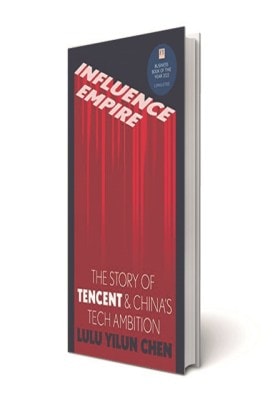With a market capitalisation of over $400 billion, Tencent is among the biggest Chinese companies. Yet, very few outside China would know much about the company that has grown to become a Chinese behemoth, commanding sectors as diverse as micro-blogging and ride-hailing to fintech and cloud operations, not to forget its super app WeChat, with a whopping 1.3 billion users. The story of Tencent and China’s tech ambition is what writer and Bloomberg journalist Lulu Yilun Chen narrates in her book Influence Empire.
Apart from having services like WeChat, Weibo, QQ, and Didi—all behemoths in their own merit—under its fold, Tencent also holds stakes in tech companies including Tesla, Snap, Spotify, and Reddit, along with makers of hit games like Fortnite, Clash of Clans, Call of Duty, and League of Legends. It shows the sheer might of this tech empire. However, the origin of Tencent and its founder Ma Huateng, commonly called Pony Ma, is a humble one. For one, the company’s initial offering—a pager—flopped, and the second one—a chat software—only succeeded following initial hiccups.
Also read: Govt readying framework for regulated digital credit
While describing Pony’s rise, Chen draws interesting parallels with the rise of China itself. “His journey towards becoming one of the world’s most powerful men traces China’s own tumultuous transition from poor, walled-off nation to economic powerhouse,” she writes. She, interestingly, draws the same parallels between Tencent’s rise and that of China. “In many ways, the story of the rise of Tencent is that of the country’s as a whole. Tencent—and an army of tech corporations that it backed—was born out of unprecedented economic expansion, a nation’s growing confidence and gradual acceptance into the international community, and a billion people expecting a better life than their parents.” Such insights into China’s journey, its economic expansion along with its phenomenal growth in the tech and Internet landscape add intrigue to the overall read.

While writing about the Tencent CEO, the writer assumes a non-judgmental tone, such as while writing about the highly prevalent copycat culture in the Chinese tech landscape. “Just as many of China’s largest internet companies started out by imitating Western peers—Sohu from Yahoo, Baidu from Google, Weibo from Twitter, Alibaba from eBay—Tencent’s first hit came from emulating ICQ,” she writes, without criticising the tactic but analysing from a larger point of view and not keeping a microscopic focus on Tencent alone.
A successful strategy that the company adopted was investing in startups for various operations instead of trying to do everything on its own. “Tencent has two core competencies: capital and traffic volume. There’s a lot of great entrepreneurs outside, and if you turn every single one of them into your enemy, it’s not a good thing. As a company you can’t actually hire these entrepreneurs, so what are you going to do? Investment is actually the best way to get a piece of their action,” Chen writes quoting Martin Lau, “Pony’s right-hand man”.
Hence, Tencent became “an incubator for startups, instead of a killer. It would invest in them, often by taking minority stakes, and grow an ecosystem of companies,” Chen writes. This strategy has been so successful that of all the investments, at least 122 have become unicorns, and at least 63 have gone public, the Bloomberg journalist comments.
However, having capitalist ambitions in a communist country governed by a dictatorial regime is never easy. Narrating Tencent’s maneuvering tactics of keeping the country’s communist regime satisfied while raking in billions is where Chen shines. China’s state surveillance especially against critics is a well-known fact. And Internet companies not just kowtow the state’s line but also aid it. “A popular joke among Chinese internet users: if you order up too many deliveries, especially during sensitive political summits, you might get the cops knocking on the door on suspicion that you’re harbouring fugitives at home,” Chen quips.
And Tencent has played a role too. “WeChat’s conception is also a story of compromise and controversy—how politically unaware tech geeks found their product in the crosshairs of the Chinese government, and through a gradual series of tweaks in response to periodic crackdowns and cycles of self-censorship, it became the go-to app for surveillance,” Chen writes.
Yet, many find themselves in the crosshairs of the government. “The country’s business landscape is littered with tales of billionaires who became just a tad too complacent, too smug, too vocal, too flamboyant, too political, and succumbed to imprisonment or even inexplicable deaths. The best way to describe how the government treats its internet tycoons is the carrot-and-stick approach,” she writes.
Tencent, too, has found itself on the receiving end of the state’s directives, especially in its gaming business. This is despite Pony being a “member of China’s legislative council, which, along with the country’s elite (mostly Party members) convenes once a year in Beijing to discuss the nation’s agenda.”
Having successfully dominated China’s Web 2.0, what is next for it? It is cloud computing as Chen writes. Metaverse and Web 3.0 have also become a buzzword in the Chinese Internet landscape.
How that space will pan out is yet to be seen. But Lulu Yilun Chen’s book does justice to mapping the company’s rise. It can be especially interesting for Indians, as the startup space is an evolving one here too. Insights into what is probably one of China’s most successful entrepreneurial undertakings will surely offer many important lessons.
Influence Empire: The Story of Tencent and China’s Tech Ambition
Lulu Yilun Chen
Hodder & Stoughton
Pp 283, Rs 699








